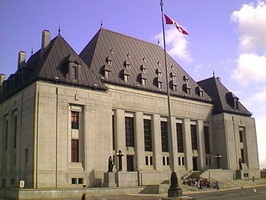Chaque fois que l'indivisibilité de la liberté est violée, nous sommes obligés d’exprimer notre opposition. Particulièrement, quand cette violation se produit dans notre cours. Et précisément quand ce que nous défendons est la souveraineté du choix individuel. Parce que la liberté de choisir est au cœur d'une société libre. C'est la leçon objective dans la différence entre la liberté et la tyrannie.
Last Thursday the Supreme Court of Canada not only compromised that freedom – it compromised its own integrity. By ruling Quebec’s Bill 104 unconstitutional on the grounds that it breached minority language rights protected by Sec.23 of the Canadian Charter of Rights and Freedoms, but then delaying the executability of its own judgment for a year in order to give the Quebec government time to find a more palatable method of breaching those self-same rights, the Court politicized itself to the point of self-abnegation.
 A right is a right is a right. Neither the Charter, nor any document ever penned, can create a right. All the great documents of mankind reflecting our transcendent yearnings for redemptive change, either mirror the freedoms we are inalienably born with or strive to enshrine equitable arrangements for their expansion. The latter is what the Charter attempted in guaranteeing minority-language education rights everywhere in Canada. That, the Supremes recognized. But then they left the door open for the violation of those rights again. Nothing can make that conscionable.
A right is a right is a right. Neither the Charter, nor any document ever penned, can create a right. All the great documents of mankind reflecting our transcendent yearnings for redemptive change, either mirror the freedoms we are inalienably born with or strive to enshrine equitable arrangements for their expansion. The latter is what the Charter attempted in guaranteeing minority-language education rights everywhere in Canada. That, the Supremes recognized. But then they left the door open for the violation of those rights again. Nothing can make that conscionable.
C’est à se demander si un individu aurait violé une certaine loi criminelle ou civile, est-ce que la Cour confirmerait la loi mais donnerait à l'individu une année pour la contourner? Bien sûr que non. Cette décision a été motivée par la convenance politique. Elle a cherché, en même temps, à confirmer le principe et à plaire au pouvoir. Ce jeu d’équilibre n'a jamais fonctionné dans l’histoire lamentable de ce monde. Ça rabaisse tout simplement le respect du public pour la justice.
It is interesting to note that so many were shocked when the Mouvement souverainiste du Québec (MSQ) called for a demonstration outside the offices of lawyer Brent Tyler who won the 104 case. Among the reasons the MSQ gave for the demonstration was that Tyler should learn that “challenging Francophone rights has consequences.” People were stunned at the implicit threat linked to the word “rights.”. But why should they be. If the Supreme Court can prejudice a right through legal machinations, how much less legitimate is it for the MSQ to prejudice that right – as well as that of free expression - through physical menace? It is only a question of degree. It is the Court itself that has cheapened Canadian conscience and constitutional consequence and left the door open for thugs. The Supremes have not learned that appeasement never works. As Churchill said, “An appeaser is someone who feeds the crocodiles hoping they’ll eat them last. But eat them he will.”
In the 104 reference the Court’s decision signaled that Quebec cannot dismiss through legislation all private English-language education. The court insisted that English-eligibility certificates be handed out on the basis of a nuanced “global qualitative assessment of a child’s educational pathway.” The Court made clear that Quebec cannot discriminate in limiting access to English education. Yet in giving Quebec a year to find a non-discriminatory method of closing the springboard into English education, it sustained the general Quebec objective of social and political marginalization of minorities and the language rights that adhere to them. In so doing it not only failed in its duty to uphold Charter protection for minorities, it also inherently narrowed the scope of opportunity for Francophones. The Court did not act justly. Twenty-five kids who trusted in our justice system can attest to that.
L’étendard d'une société juste ne peut pas être porté légèrement, et son fardeau est tombé de plusieurs mains à travers l'histoire. Chaque génération doit être vigilante qu’il ne tombe pas de ses mains. En essayant d’introduire les notions d’être politiquement correct et de plaire à tous à nos lois, ou de juger des lois à travers ces prismes, ce que nous faisons est de simplement encourager la perversion de nos confiances les plus sacrées en apaisant chaque intérêt spécial, régional et ethnique qui semble constituer une menace.
Les droits et les libertés sont indivisibles. Si nous voulons les apprécier nous devons être disposés à les prolonger à tous avec la plus grande largesse possible. C'est l'espoir de cette nation. C'est ce que l’article 23 essaie de faire. C’est ironique alors que cette article était communément appelée la « clause Canada. » Car c'est lui que les magistrats suprêmes ont vraiment abandonnés. Ce pays !

























Comments
Please login to post comments.